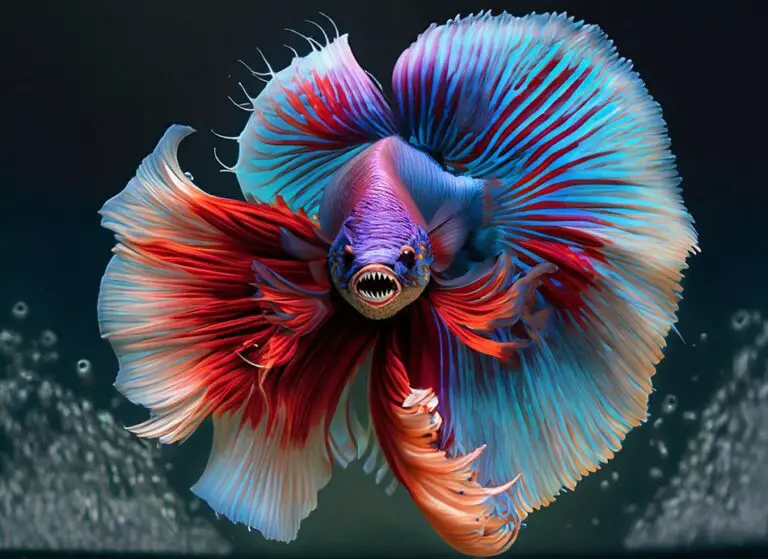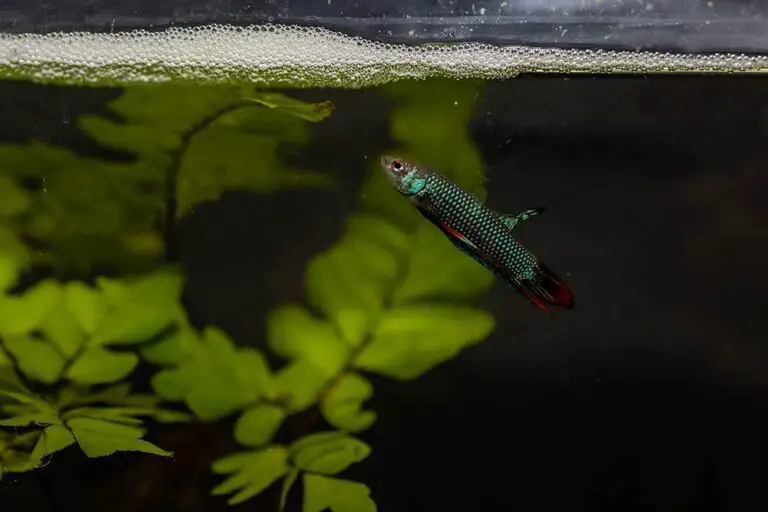How Well Can Betta Fish See in the Dark
If you often wonder whether to keep your betta’s tank light on or off at night, you are not alone. Many fish live in deep, dark water with excellent night vision. So, how well can betta fish see in the dark?
Betta fish can see much better in daylight than in darkness. They are not completely blind in the darkness, but their retinas respond slowly to changing light conditions. Betta fish can sense their surroundings in complete darkness through pressure-sensitive points along their lateral line.
Whether a betta fish can see in the dark or not, they don’t need light to feel comfortable in their environment.
Bettas are one of the only fish that can see color, but how well varies between breeds.
It makes sense that betta fish have a good color perception as they display vibrant colors intended for others of the same species to see.

This blog post will lightly discuss some of the topics around a bettas vision, such as:
- How well can betta fish see?
- How well can betta fish see in the dark?
- How does a bettas eyesight work?
- Can betta fish see color?
- Do betta fish like light?
- Do betta fish need light at all?
I will try and explain these questions in as simple terms as possible to avoid turning this post into a medical journal, but by the end, you should have a better understanding of a betta fish’s vision.
Make sure to check out my guide to betta fish care to find out more about this wonderful fish.
How Well Can Betta Fish See
During normal light conditions, betta fish can see quite well. Their eyes can detect even the smallest movement, which is probably why betta fish are so good at hunting prey!
Water is not a good medium for transmitting light anyway, it transmits sound much better. Light is more quickly absorbed in water, especially at certain wavelengths.
Outside of the water, most animals can see great distances, often several kilometers on a clear day, and eyes are developed for this, however, underwater, light does not carry, and visibility will be much less.
Often in dim light and murky water, visibility can reduce to only several feet, so the vision of most fish has developed only to see what is close by. Instead, they have developed many other senses.
Betta fish sleep at night and are classed as diurnal creatures, which means they are most active during the day when they will do most of their feeding.
Since betta fish sleep when it is dark, they will not need to rely on their vision to navigate.
Can Betta Fish See In The Dark
Many fish have eyes that are well adapted to see in the dark, especially marine fish, and nighttime is when they will often feed. Often these fish will live deeper in the water where light does not carry as well, which is why they are better equipped for dark places.
Betta fish can see in the dark, but not as well as some fish species. Betta fish eyes are very well adapted to see bright saturated colors but are less capable in the dark. Fish that do see well in the dark often see in black and white.
In the following sections, I will talk a little more about how a betta’s eyes work.
Do Betta Fish Have Night Vision
Betta fish vision is not as good as many other fishes in the dark because their eyes are much better adapted to see color.
It is not widely understood why betta fish have better color vision than night vision, but it is how they have evolved and will have much to do with where betta fish live in their natural habitat.
Betta fish are also very colorful compared to many other fish, and this color is involved in mating rituals. Female betta fish select a male based on many factors, such as aggression, flashiness in color, and movement.

Female betta fish prefer certain colors and patterns over others, so their ability to distinguish between colors is essential when selecting a male betta fish as their mate.
The trade-off between good color vision instead of good night vision is one they have adapted to live with very well.
The Lateral Line
As betta fish have poor vision in the dark, like other fish, they have many other sensory organs which they can rely on, kind of as a sixth sense.
Bettas have a set of pressure sensors running along their lateral lines. The pressure sensors appear as tiny holes along the whole length of the lateral lines.
These pressure-sensitive receptors can detect minute water pressure and vibration changes in the surrounding water, helping them navigate quite easily in the dark, sense movement from predators or prey, and help them find food.

How Does A Bettas Eyesight Work
As already mentioned, betta fish are classed as diurnal daytime creatures, and the retina of diurnal animals is slightly different.
To try and explain simply, the retinas are made up of rods and cones. Rods are used in night vision, and cones are to do with color.
Fish that are more active in the day will generally have more cones and relatively poor vision at night, whereas those that are more active at night usually have more rods, achieving better vision at night.
Betta fish have adapted well to see colors in the water because they have many more cones than rods which is also why bettas can’t see too well at night.
Poor Iris Functionality
Betta fish have slow iris functionality, which is part of the eye that lets in light. In dark conditions, the iris widens to let in more light; when it is bright, the iris closes to let in less light.
Poor iris functionality makes betta fish adapt very slowly to changing light conditions.
Monocular Vision
Another point to make about fish’s vision, in general, is that because they have an eye on each side of their head, they experience monocular vision, which means they see independently out of each eye.
Seeing a different image out of each eye means they can see in two directions simultaneously, which is ideal for tracking predators or prey.
People and many animals have two eyes at the front, which can focus on the same object simultaneously (binocular vision) and helps gain depth perception. As fish don’t have this, their depth perception is poor.
Can Betta Fish See Color
I have already briefly mentioned that a betta’s eyes are made up of more cones than rods which give them a better perception of color which would be important due to their colorful flare during mating, but did you know that betta fish can also see in a different spectrum than humans can.
How Well Can A Betta See Color
Betta fish can see in ultraviolet light, which means that betta fish can see colors humans cannot. The betta fish’s ability to see ultraviolet light is so strong that betta fish can even be trained to distinguish between different colors!
I have also mentioned that water absorbs light, so the deeper the water, the darker it gets. Deep-sea fish also won’t see colors as most of the light spectrum is absorbed near the surface.
This is not a problem for betta fish in their natural habitat, usually shallow rice paddies, puddles, or shallow, slow-moving rivers. The crystal clear water is often very shallow, so they benefit from the full light spectrum.
Most deep-sea fish have developed a monochromatic vision, meaning they only see in black and white.
Not needing color vision, these fish do not require as many cones as previously described above, thus leaving more room for extra rods and often having excellent night vision to navigate their dark environment.
Do Betta Fish Like Light
Betta fish are very comfortable in natural and artificial light, such as fluorescent and colored LED lights.
Too much light is not good for betta fish. All animals in the wild are used to the natural cycle of day and night, which will affect their circadian rhythm.
Eight to ten hours of light is sufficient for your betta tank, so turning off the aquarium light at night will give your betta fish a chance to sleep and allow the natural, biological processes to take place.

A betta fish will be used to natural sunlight, but you should keep your betta tank away from direct sunlight, or it can overheat quite quickly, stressing your betta and leading to algae growth.
You should consider artificial light if you don’t feel you are naturally getting enough light to your fish tank. Most types of ambient light are fine, and you can buy aquarium lighting systems quite cheaply, either online or in most pet stores.
I recommend you read my article on whether fish need light at night, which explains a little more about the correct requirements for lighting your fish tank.
Do Betta Fish Need Light At All
From what I have explained so far, I think we can establish that betta fish don’t actually need light to survive, but unless you are going to keep your betta tank locked away in a dark room with no windows (and why would you!), your betta tank will get some ambient light through the day (and maybe night).
Just because betta fish don’t need light, you should ensure your tank mimics their natural environment as much as possible. You wouldn’t buy a dog and keep it locked in a dark cupboard all day, and a fish is no different.
Just make sure to provide sufficient light so that your betta fish can feel comfortable. If you have a relatively dark room, move your betta tank a little closer to the window or add an aquarium light. How much light will depend on how your betta fish responds.
Read my article: Do Betta Fish Need Light for further information.
Conclusion
I hope you have enjoyed this post and can understand a little better how a betta fish’s poor night vision affects its ability to see in the dark and how it can adapt to this quite easily.







